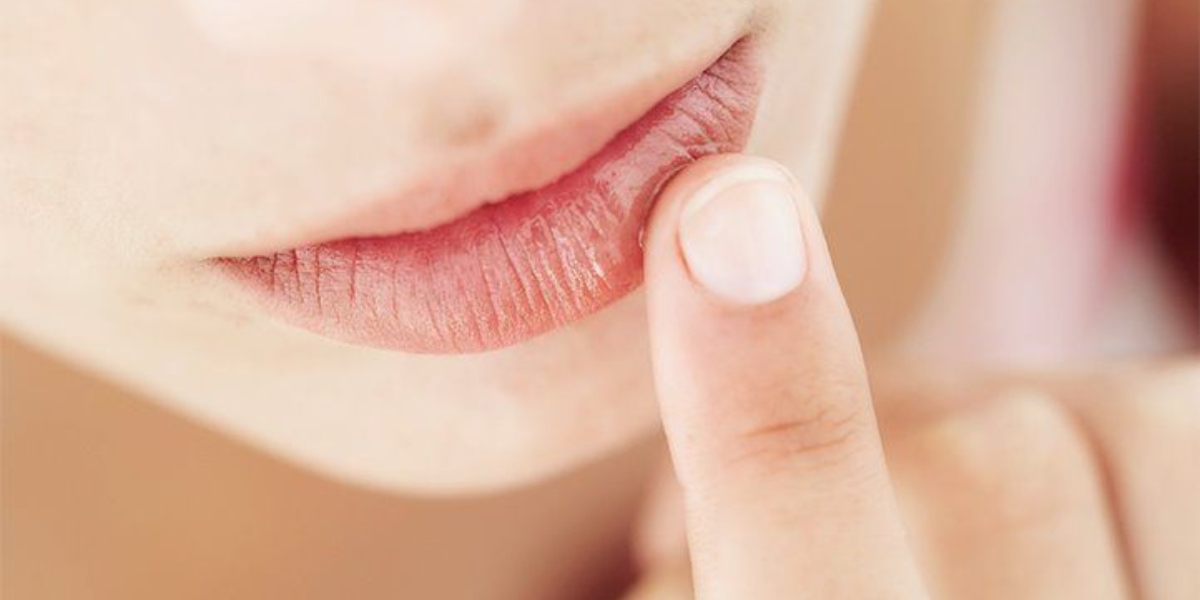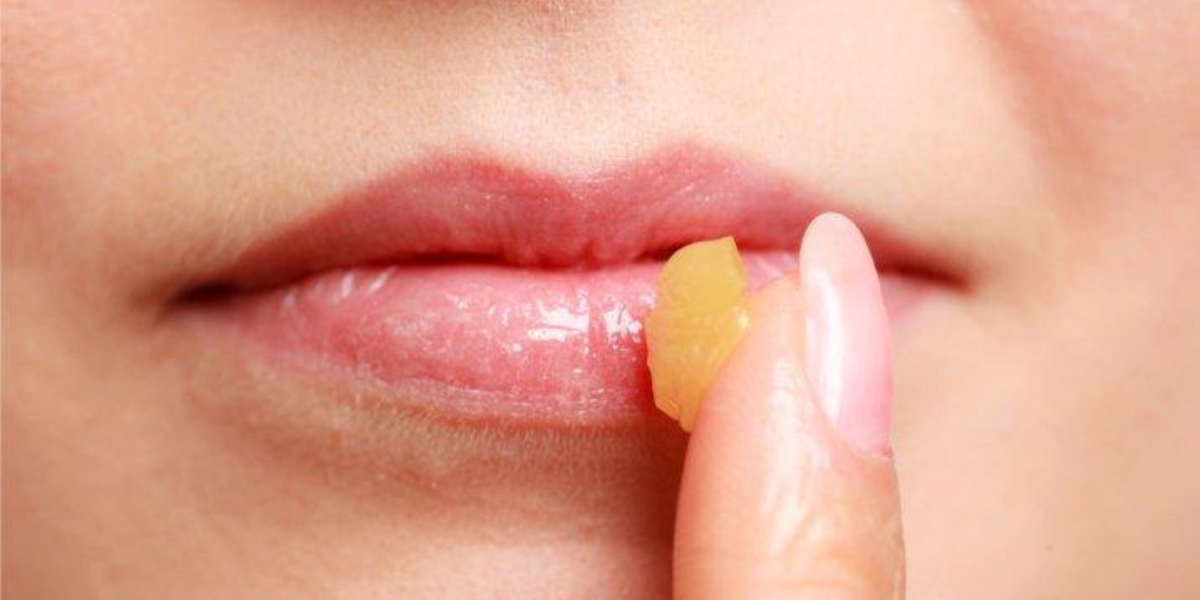Blog
Dry & Peeling Lips? Discover Why and How to Treat Them

If you have dry lips that burn, your discomfort warrants an effective treatment regime that can get your lips back in the pink of health. To get the right treatment, however, you must first understand why you have dry lips. Understanding the root cause can also tell you what your dry lips are a sign of and shape any follow-up care you might require.
It’s easy to leave your lips out of your skin care routine. Sure, maybe you haphazardly swipe on the balm that lives at the bottom of your work bag or nightstand drawer, but aside from that, unless you’re applying makeup, we’re guessing you don’t give this delicate area as much thought as it deserves—until you end up with chapped lips, that is.
And when dryness strikes, it can be tough to figure out what to do to alleviate the peeling and/or cracking—especially when nothing seems to be helping. Here’s the thing: There are a bunch of reasons why your lips flake on you, not to mention a variety of things you can do to moisturize them and find relief.
What causes dry lips?
We’ve compiled a list of some of the main causes of dry and chapped lips.
1. Weather
You probably notice that your lips become drier over winter. Cool weather, as well as the wind and cold air that comes with it, can inflict some fairly heavy damage to your lips. In summer, the sun’s UV rays can do the same thing. Applying a moisturizing balm gives your lips a protective seal from the elements, while a balm with SPF offers an extra layer of defense when you’re out in the sun. That sounds pretty good to us!
2. Dehydration
Dry lips can be a tell-tale sign that your body isn’t getting enough water. Dehydration can wreak havoc on your skin, especially your delicate lips, as it upsets your body’s natural balance of minerals. Drinking eight or so glasses of water per day is one of the best ways of preventing dehydration, but eating water-rich fresh fruit and veggies like cucumbers, tomatoes, spinach, melons, berries and oranges can help too. Plus, these foods are rich in vitamins and minerals that nourish the skin – bonus!
3. Lip Licking
While licking your lips might seem like an easy quick fix, it can actually make your lips even drier over time. When you lick your lips, it coats them in a layer of saliva. This can damage your lips in a couple of ways. Firstly, the saliva evaporates, taking the natural moisture from your lips with it. Secondly, saliva is a natural enzyme that breaks down foods – so too much of it can cause the skin on your lips to weaken and crack. Ouch!
4. Infections
Licking your lips too much can also cause excess saliva to build up and gather in the corners of your mouth. This creates a nice, warm environment for fungal infections to grow, which only makes dry lips worse. The icky pain and cracking that can come about as a result of a fungal infection is known as cheilitis, but it can be prevented with a good moisture-rich lip balm (phew).
5. Allergies
Some ingredients in everyday items like toothpaste and lipstick can cause chapped lips, as can certain foods and ingredients, such as food coloring. If you suspect one of these might be the cause, try and eliminate it for a while to see if it makes a difference.
6. Vitamin Deficiency
Vitamins like B1 (thiamine), B2 (riboflavin) and B6 are some of the best things for keeping your lips soft and smooth. Dry lips can be due to a lack of these vitamins, so you could try squeezing more of them into your diet. Beef, milk, nuts and oats are good sources of B1, while green vegetables, meat, fish and dairy contain B2. You’ll find B6 in pork, chicken, fish and wholegrain cereals.
Reasons for Dry Lips:
Uncovering the reason you have dry lips is important. It’s not just about the discomfort or aesthetics – our lips often can indicate underlying health issues.
1. Dry lips and digestive problems
Digestive problems might not seem like they have anything to do with your lips, but there’s a connection. Our gut health often reflects on our skin, and the lips are no exception. If your body isn’t absorbing nutrients properly because of digestive issues, it can sometimes lead to dry, chapped lips.
2. Dry lips and vitamin deficiency
Your lips can be a window into your overall health. One of the common causes of dry lips is a deficiency in certain vitamins. For instance, a deficiency in Vitamin B, especially B2 (riboflavin), can result in dry lips. If you suspect this might be the reason, consider getting a blood test to check your vitamin levels.
3. Dry lips with lipstick
Many are unaware that their favorite lipsticks could be drying out their lips. Some lipsticks, especially long-wear and matte formulas, can strip the lips of their natural oils, leading to dryness. Applying a lip balm before your lipstick and switching to moisturizing lip colors is always good practice.
4. Dry lips during pregnancy
Pregnancy can bring about a plethora of changes in a woman’s body. Due to hormonal fluctuations, some pregnant mothers experience drier skin and lips. It’s essential to stay hydrated and moisturized during this period.
5. Dry lips on newborns
Newborns are also susceptible to dry lips. While this might be alarming to notice, it’s fairly common. Reasons like weather conditions or the adjustment period when a newborn gets accustomed to the environment outside the womb can play a part. Keeping the baby’s lips moisturized with a pediatrician-approved balm is usually recommended.
What are the symptoms of dry lips?
Symptoms of dry lips, besides the obvious flakiness and cracks, include:
- Redness
- Swelling
- Occasional bleeding
- dryness
- flaking
- scales
- sores
- cracks
If you experience severe symptoms, or if they persist, it’s always a good idea to consult a doctor.
How do you treat dry lips? (Dry lips remedies)
Treatment for dry lips generally involves addressing the underlying cause and providing symptomatic relief.
Treatment is typically two-fold, involving home remedies and medical attention, especially for more severe cases.
Home remedies for dry lips
- Stay hydrated. Drink adequate water daily to prevent dehydration, which can contribute to dry lips. Proper hydration helps maintain moisture levels in your lips as well as in your skin overall. If you’re interested in improving your skin’s health alongside lip care try these natural remedies to remove dark spots at home to support a balanced, hydrated complexion.
- Use balm for dry lips. A good quality lip balm is one of the most effective remedies for dry lips. Choosing one that’s free from harmful chemicals and is enriched with ingredients like shea butter, vitamin E and natural oils is vital. A good lip balm can provide immediate relief and act as a protective barrier against environmental factors.
- Protect from harsh weather. When outdoors, shield your lips from cold, windy, and dry weather by wearing a scarf or applying a lip balm with a sun protection factor (SPF). This can help prevent moisture loss and protect your lips from further damage.
- Avoid lip licking. Licking your lips can worsen dryness. Saliva evaporates quickly, leaving your lips even drier. Instead, use a lip balm to moisturize your lips whenever they feel dry.
- Use a humidifier. A humidifier can add moisture to the air in drier indoor environments and prevent your lips from drying out.
- Gently exfoliate. If your lips have flaky or peeling skin, gently exfoliate them to remove dead cells. Use a soft toothbrush or a lip scrub to lightly massage your lips in circular motions. Follow up with a moisturizing lip balm.
- Avoid irritants. Some lip products, fragrances, and certain ingredients can worsen dry lips. Opt for fragrance-free lip balms and avoid using drying lip cosmetics.
Medical treatments for dry lips
- Topical corticosteroids. Your doctor may prescribe topical corticosteroid creams or ointments to reduce inflammation, redness, and swelling associated with dry lips. These medications can help alleviate symptoms and promote healing.
- Antibiotics or antifungal medications. If a bacterial or fungal infection is the underlying cause of dry lips, your doctor may prescribe topical or oral antibiotics or antifungal medications to target the underlying infection and resolve the inflammation.
- Immune-modulating medications. In certain cases of severe or chronic dry lips, immune-modulating medications such as calcineurin inhibitors may be prescribed. These medications help regulate the immune response and reduce inflammation.
- Allergy management. If dry lips are caused by an allergic reaction to certain substances or allergens, identifying and avoiding the trigger is essential. Sometimes, your doctor may recommend antihistamines or allergy shots to manage the allergic response and prevent cheilitis flare-ups.
- Nutritional supplements. When dry lips are linked to nutritional deficiencies, such as vitamin B or iron deficiencies, your doctor may recommend specific supplements to address the deficiency and support lip health.
- Dental treatment. If dry lips are associated with oral factors, such as ill-fitting dentures or oral hygiene issues, your dentist may address these underlying causes and provide the appropriate treatment.
Risk factors for chapped lips
Everyone can get chapped lips, particularly if they have dry skin.
Taking certain medications can also increase your risk of developing chapped lips. Medications and supplements that can cause chapped lips include:
- vitamin A
- retinoids (Retin-A, Differin)
- lithium (commonly used to treat bipolar disorder)
- chemotherapy drugs
People who are dehydrated or malnourished are also more likely to have chapped lips than other people.
Call your doctor if either of these are associated with your chapped lips—dehydration and malnutrition are both serious conditions that require immediate medical attention.
Cheilitis
If the severe dryness and cracking doesn’t improve with self-care, you should see a dermatologist. Cheilitis is often to blame for severely chapped lips. This is a condition marked by cracked skin at the mouth corners and several cracks on your lips.
If you have this condition, your lips may:
- be dark pink or red in color
- have a lumpy texture
- develop ulcers
- have white plaques on the surface
Cheilitis is often attributed to infections and inflammatory diseases, such as Crohn’s disease. Dental trauma and excessive saliva production may also turn a regular case of chapped lips into cheilitis. Bacteria can enter through the cracks and cause infection. Adults and children who have orthodontic braces, wear dentures, or use pacifiers are all susceptible to developing cheilitis.
A dermatologist can determine whether your dry lips are simply chapped or if you have cheilitis.
Dehydration and malnutrition
Dry lips can also be caused by dehydration or malnutrition. Dehydration causes symptoms including:
- lightheadedness
- constipation
- decreased urine production
- dry mouth
- headache
In severe cases, a person suffering from dehydration may experience low blood pressure, fever, rapid breathing, or a rapid heartbeat.
Malnutrition is characterized by many of the same symptoms as dehydration. Additional symptoms can include:
- muscle weakness
- decaying teeth
- bloated stomach
- bone fragility
Malnutrition can be caused by vitamin deficiencies, so those on limited diets (for example, vegetarians) need to make sure that they are getting enough of the vitamins they need.
People with alcohol addiction are also more susceptible to malnutrition due to vitamin deficiencies because excessive alcohol use can interfere with the body’s vitamin absorption. Older adults are also at higher risk for malnutrition because decreased appetite is common.
If you suspect you are dehydrated or malnourished, see your doctor right away.
Takeaways
Dry lips are usually a short-term issue and can typically be healed at home. Using a moisturizing lip balm or ointment and protecting your lips during certain weather conditions can help with preventing dry lips. Relief from dry lips treated at home should come within a few weeks, depending on how severe the condition is. Talk to your doctor if your dried lips persist after trying home treatments.
How do you heal chapped lips?
Using a lip balm with moisturizing ingredients, getting enough water and nutrients, and avoiding licking your lips too much are all ways you can heal chapped lips at home. For more severe cases, a dermatologist may provide stronger treatment options.
What are common causes of chapped lips?
Some common causes of chapped lips include cold weather, drinking alcohol, certain medical conditions or medications or infections.
Does chapped lips mean infection?
Chapped lips are common. If your symptoms last longer than 3 weeks talk to your doctor. They may recommend a sample or biopsy to check for funguses and bacteria.


